- Home
- Ernest Hemingway
The Nick Adams Stories Page 8
The Nick Adams Stories Read online
Page 8
“I said that first.”
“I know. Maybe we say it because we are afraid.”
“No. I’m not afraid because I’m with you. But I know I’d be afraid alone. Did you ever come here with anyone else?”
“No. Only by myself.”
“And you weren’t afraid?”
“No. But I always feel strange. Like the way I ought to feel in church.”
“Nickie, where we’re going to live isn’t as solemn as this, is it?”
“No. Don’t you worry. There it’s cheerful. You just enjoy this, Littless. This is good for you. This is the way forests were in the olden days. This is about the last good country there is left. Nobody gets in here ever.”
“I love the olden days. But I wouldn’t want it all this solemn.”
“It wasn’t all solemn. But the hemlock forests were,”
“It’s wonderful walking. I thought behind our house was wonderful. But this is better. Nickie, do you believe in God? You don’t have to answer if you don’t want to.”
“I don’t know.”
“All right. You don’t have to say it. But you don’t mind if I say my prayers at night?”
“No. I’ll remind you if you forget.”
“Thank you. Because this kind of woods makes me feel awfully religious.”
“That’s why they build cathedrals to be like this.”
“You’ve never seen a cathedral, have you?”
“No. But I’ve read about them and I can imagine them. This is the best one we have around here.”
“Do you think we can go to Europe some time and see cathedrals?”
“Sure we will. But first I have to get out of this trouble and learn how to make some money.”
“Do you think you’ll ever make money writing?”
“If I get good enough.”
“Couldn’t you maybe make it if you wrote cheerfuller things? That isn’t my opinion. Our mother said everything you write is morbid.”
“It’s too morbid for the St. Nicholas,” Nick said. “They didn’t say it. But they didn’t like it.”
“But the St. Nicholas is our favorite magazine.”
“I know,” said Nick. “But I’m too morbid for it already. And I’m not even grown-up.”
“When is a man grown-up? When he’s married?”
“No. Until you’re grown-up they send you to reform school. After you’re grown-up they send you to the penitentiary.”
“I’m glad you’re not grown-up then.”
“They’re not going to send me anywhere,” Nick said. “And let’s not talk morbid even if I write morbid.”
“I didn’t say it was morbid.”
“I know. Everybody else does, though.”
“Let’s be cheerful, Nickie,” his sister said. “These woods make us too solemn.”
“We’ll be out of them pretty soon,” Nick told her. “Then you’ll see where we’re going to live. Are you hungry, Littless?”
“A little.”
“I’ll bet,” Nick said. “We’ll eat a couple of apples.”
They were coming down a long hill when they saw sunlight ahead through the tree trunks. Now, at the edge of the timber there was wintergreen growing and some partridgeberries and the forest floor began to be alive with growing things. Through the tree trunks they saw an open meadow that sloped to where white birches grew along the stream. Below the meadow and the line of the birches there was the dark green of a cedar swamp and far beyond the swamp there were dark blue hills. There was an arm of the lake between the swamp and the hills. But from here they could not see it. They only felt from the distances that it was there.
“Here’s the spring,” Nick said to his sister. “And here’s the stones where Ícamped before.”
“it’s a beautiful, beautiful place, Nickie,” his sister said. “Can we see the lake, too?”
“There’s a place where we can see it. But it’s better to camp here. I’ll get some wood and we’ll make breakfast.”
“The firestones are very old.”
“it’s a very old place,” Nick said. “The firestones are Indian.”
“How did you come to it straight through the woods with no trail and no blazes?”
“Didn’t you see the direction sticks on the three ridges?”
“No.”
“I’ll show them to you sometime.”
“Are they yours?”
“No. They’re from the old days.”
“Why didn’t you show them to me?”
“I don’t know,” Nick said. “I was showing off I guess.”
“Nickie, they’ll never find us here.”
“Í hope not,” Nick said.
At about the time that Nick and his sister were entering the first of the slashings the warden who was sleeping on the screen porch of the house that stood in the shade of the trees above the lake was wakened by the sun that, rising above the slope of open land behind the house, shone full on his face.
During the night the warden had gotten up for a drink of water and when he had come back from the kitchen he had lain down on the floor with a cushion from one of the chairs for a pillow. Now he waked, realized where he was, and got to his feet. He had slept on his right side because he had a .38 Smith and Wesson revolver in a shoulder holster under his left armpit. Now, awake, he felt for the gun, looked away from the sun, which hurt his eyes, and went into the kitchen where he dipped up a drink of water from the pail beside the kitchen table. The hired girl was building a fire in the stove and the warden said to her, “What about some breakfast?”
“No breakfast,” she said. She slept in a cabin out behind the house and had come into the kitchen a half an hour before. The sight of the warden lying on the floor of the screen porch and the nearly empty bottle of whiskey on the table had frightened and disgusted her. Then it had made her angry.
“What do you mean, no breakfast?” the warden said, still holding the dipper.
“Just that.”
“Why?”
“Nothing to eat.”
“What about coffee?”
“No coffee.”
“Tea?”
“No tea. No bacon. No corn meal. No salt. No pepper. No coffee. No Borden’s canned cream. No Aunt Jemima buckwheat flour. No nothing.”
“What are you talking about? There was plenty to eat last night.”
“There isn’t now. Chipmunks must have carried it away.”
The warden from down state had gotten up when he heard them talking and had come into the kitchen.
“How do you feel this morning?” the hired girl asked him.
The warden ignored the hired girl and said, “What is it, Evans?”
“That son of a bitch came in here last night and got himself a pack load of grub.”
“Don’t you swear in my kitchen,” the hired girl said.
“Come out here,” the down-state warden said. They both went out on the screen porch and shut the kitchen door.
“What does that mean, Evans?” the down-state man pointed at the quart of Old Green River which had less than a quarter left in it. “How skunk-drunk were you?”
“Í drank the same as you. I sat up by the table—”
“Doing what?”
“Waiting for the goddam Adams boy if he showed.”
“And drinking.”
“Not drinking. Then I got up and went in the kitchen and got a drink of water about half past four and I lay down here in front of the door to take it easier.”
“Why didn’t you lie down in front of the kitchen door?”
“I could see him better from here if he came.”
“So what happened?”
“He must have come in the kitchen, through a window maybe, and loaded that stuff.”
“Bullshit.”
“What were you doing?” the local warden asked.
“I was sleeping the same as you.”
“Okay. Let’s quit fighting about it. That doesn’t do any good.�
�
“Tell that hired girl to come out here.”
The hired girl came out and the down-state man said to her, “You tell Mrs. Adams we want to speak to her.”
The hired girl did not say anything but went into the main part of the house, shutting the door after her.
“You better pick up the full and the empty bottles,” the down-state man said. “There isn’t enough of this to do any good. You want a drink of it?”
“No thanks. I’ve got to work today.”
“I’ll take one,” the down-state man said, “it hasn’t been shared right.”
“I didn’t drink any of it after you left,” the local warden said doggedly.
“Why do you keep on with that bullshit?”
“It isn’t bullshit.”
The down-state man put the bottle down. “All right,” he said to the hired girl, who had opened and shut the door behind her. “What did she say?”
“She has a sick headache and she can’t see you. She says you have a warrant. She says for you to search the place if you want to and then go.”
“What did she say about the boy?”
“She hasn’t seen the boy and she doesn’t know anything about him.”
“Where are the other kids?”
“They’re visiting at Charlevoix.”
“Who are they visiting?”
“I don’t know. She doesn’t know. They went to the dance and they were going to stay over Sunday with friends.”
“Who was that kid that was around here yesterday?”
“I didn’t see any kid around here yesterday.”
“There was.”
“Maybe some friend of the children asking for them. Maybe some resorter’s kid. Was it a boy or a girl?”
“A girl about eleven or twelve. Brown hair and brown eyes. Freckles. Very tanned. Wearing overalls and a boy’s shirt. Barefooted.”
“Sounds like anybody,” the hired girl said. “Did you say eleven or twelve years old?”
“Oh, shit,” said the man from down state. “You can’t get anything out of these mossbacks.”
“If I’m a mossback what’s he?” the hired girl looked at the local warden. “What’s Mr. Evans? His kids and me went to the same schoolhouse.”
“Who was the girl?” Evans asked her. “Come on, Suzy. I can find out anyway.”
“I wouldn’t know,” Suzy, the hired girl, said, “it seems like all kinds of people come by here now. I feel just like I’m in a big city.”
“You don’t want to get in any trouble, do you, Suzy?” Evans said.
“No, sir.”
“I mean it.”
“You don’t want to get in any trouble either, do you?” Suzy asked him.
Out at the barn after they were hitched up the down-state man said, “We didn’t do so good, did we?”
“He’s loose now,” Evans said. “He’s got grub and he must have his rifle. But he’s still in the area. I can get him. Can you track?”
“No. Not really. Can you?”
“In snow,” the other warden laughed.
“But we don’t have to track. We have to think out where he’ll be.”
“He didn’t load up with all that stuff to go south. He’d just take a little something and head for the railway.”
“I couldn’t tell what was missing from the woodshed. But he had a big pack load from the kitchen. He’s heading in somewhere. I got to check on all his habits and his friends and where he used to go. You block him off at Charlevoix and Petoskey and St. Ignace and Sheboygan. Where would you go if you were him?”
“I’d go to the Upper Peninsula.”
“Me, too. He’s been up there, too. The ferry is the easiest place to pick him up. But there’s an awful big country between here and Sheboygan and he knows that country, too.”
“We better go down and see Packard. We were going to check that today.”
“What’s to prevent him going down by East Jordan and Grand Traverse?”
“Nothing. But that isn’t his country. He’ll go some place that he knows.”
Suzy came out when they were opening the gate in the fence.
“Can I ride down to the store with you? I’ve got to get some groceries.”
“What makes you think we’re going to the store?”
“Yesterday you were talking about going to see Mr. Packard.”
“How are you going to get your groceries back?”
“I guess I can get a lift with somebody on the road or coming up the lake. This is Saturday.”
“All right. Climb up,” the local warden said.
“Thank you, Mr. Evans,” Suzy said.
At the general store and post office Evans hitched the team at the rack and he and the down-state man stood and talked before they went in.
“I couldn’t say anything with that damned Suzy.”
“Sure.”
“Packard’s a fine man. There isn’t anybody better-liked in this country. You’d never get a conviction on that trout business against him. Nobody’s going to scare him and we don’t want to antagonize him.”
“Do you think he’ll cooperate?”
“Not if you act rough.”
“We’ll go see him.”
Inside the store Suzy had gone straight through past the glass showcases, the opened barrels, the boxes, the shelves of canned goods, seeing nothing nor anyone until she came to the post office with its lockboxes and it’s general delivery and stamp window. The window was down and she went straight on to the back of the store. Mr. Packard was opening a packing box with a crowbar. He looked at her and smiled.
“Mr. John,” the hired girl said, speaking very fast. “There’s two wardens coming in that’s after Nickie. He cleared out last night and his kid sister’s gone with him. Don’t let on about that. His mother knows it and it’s all right. Anyhow she isn’t going to say anything.”
“Did he take all your groceries?”
“Most of them.”
“You pick out what you need and make a list and I’ll check it over with you.”
“They’re coming in now.”
“You go out the back and come in the front again. I’ll go and talk to them.”
Suzy walked around the long frame building and climbed the front steps again. This time she noticed everything as she came in. She knew the Indians who had brought in the baskets and she knew the two Indian boys who were looking at the fishing tackle in the first showcases on the left. She knew all the patent medicines in the next case and who usually bought them. She had clerked one summer in the store and she knew what the penciled code letters and numbers meant that were on the cardboard boxes that held shoes, winter overshoes, wool socks, mittens, caps and sweaters. She knew what the baskets were worth that the Indians had brought in and that it was too late in the season for them to bring a good price.
“Why did you bring them in so late, Mrs. Tabeshaw?” she asked.
“Too much fun Fourth of July,” the Indian woman laughed.
“How’s Billy?” Suzy asked.
“I don’t know, Suzy. I no see him four weeks now.”
“Why don’t you take them down to the hotel and try and sell them to the resorters?” Suzy said.
“Maybe,” Mrs. Tabeshaw said. “I took once.”
“You ought to take them every day.”
“Long walk,” Mrs. Tabeshaw said.
While Suzy was talking to the people she knew and making a list of what she needed for the house the two wardens were in the back of the store with Mr. John Packard.
Mr. John had gray-blue eyes and dark hair and a dark mustache and he always looked as though he had wandered into a general store by accident. He had been away from northern Michigan once for eighteen years when he was a young man and he looked more like a peace officer or an honest gambler than a storekeeper. He had owned good saloons in his time and run them well. But when the country had been lumbered off he had stayed and bought farming land. Finally when the county had g
one local option he had bought this store. He already owned the hotel. But he said he didn’t like a hotel without a bar and so he almost never went near it. Mrs. Packard ran the hotel. She was more ambitious than Mr. John and Mr. John said he didn’t want to waste time with people who had enough money to take a vacation anywhere in the country they wanted and then came to a hotel without a bar and spent their time sitting on the porch in rocking chairs. He called the resorters “change-of-lifers” and he made fun of them to Mrs. Packard but she loved him and never minded when he teased her.
“I don’t mind if you call them change-of-lifers,” she told him one night in bed. “I had the damn thing but I’m still all the woman you can handle, aren’t I?”
She liked the resorters because some of them brought culture and Mr. John said she loved culture like a lumberjack loved Peerless, the great chewing tobacco. He really respected her love of culture because she said she loved it just like he loved good bonded whiskey and she said, “Packard, you don’t have to care about culture. I won’t bother you with it. But it makes me feel wonderful.”
Mr. John said she could have culture until hell wouldn’t hold it just so long as he never had to go to a Chautauqua or a Self-Betterment Course. He had been to camp meetings and a revival but he had never been to a Chautauqua. He said a camp meeting or a revival was bad enough but at least there was some sexual intercourse afterward by those who got really aroused although he never knew anyone to pay their bills after a camp meeting or a revival. Mrs. Packard, he told Nick Adams, would get worried about the salvation of his immortal soul after she had been to a big revival by somebody like Gypsy Smith, that great evangelist, but finally it would turn out that he, Packard, looked like Gypsy Smith and everything would be fine finally. But a Chautauqua was something strange. Culture maybe was better than religion, Mr. John thought. But it was a cold proposition. Still they were crazy for it. He could see it was more than a fad, though.
“It’s sure got a hold on them,” he had told Nick Adams. “It must be sort of like the Holy Rollers only in the brain. You study it sometime and tell me what you think. You going to be a writer you ought to get in on it early. Don’t let them get too far ahead of you.”
Mr. John liked Nick Adams because he said he had original sin. Nick did not understand this but he was proud.
“You’re going to have things to repent, boy,” Mr. John had told Nick. ‘’That’s one of the best things there is. You can always decide whether to repent them or not. But the thing is to have them.”

 The Old Man and the Sea
The Old Man and the Sea Green Hills of Africa
Green Hills of Africa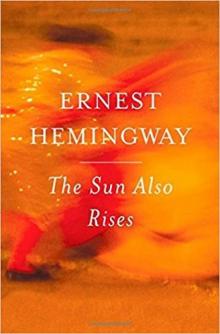 The Sun Also Rises
The Sun Also Rises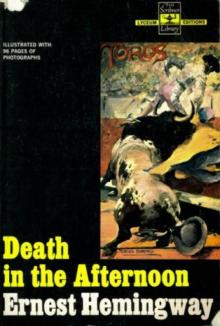 Death in the Afternoon
Death in the Afternoon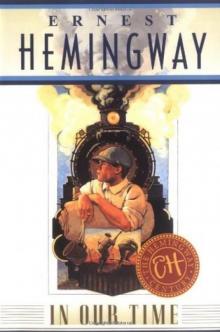 In Our Time
In Our Time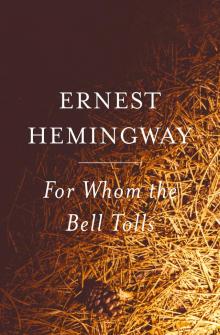 For Whom the Bell Tolls
For Whom the Bell Tolls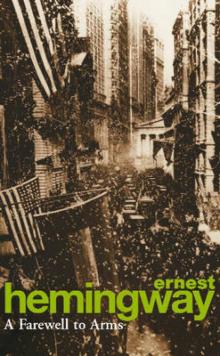 A Farewell to Arms
A Farewell to Arms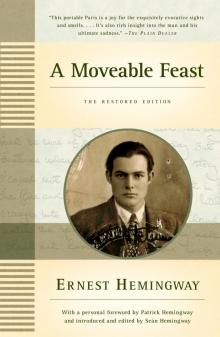 A Moveable Feast
A Moveable Feast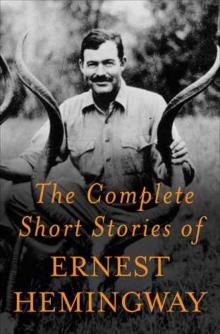 The Complete Short Stories of Ernest Hemingway
The Complete Short Stories of Ernest Hemingway Big Two-Hearted River
Big Two-Hearted River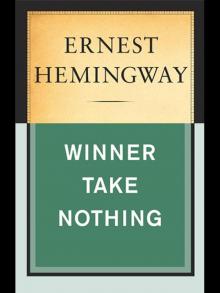 Winner Take Nothing
Winner Take Nothing Islands in the Stream
Islands in the Stream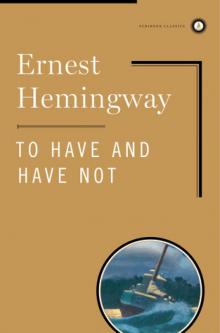 To Have and Have Not
To Have and Have Not The Snows of Kilimanjaro and Other Stories
The Snows of Kilimanjaro and Other Stories Across the River and Into the Trees
Across the River and Into the Trees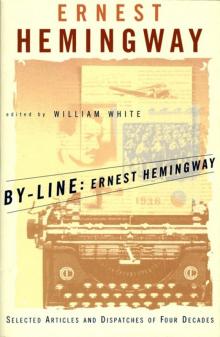 By-Line Ernest Hemingway
By-Line Ernest Hemingway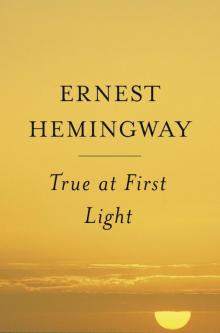 True at First Light
True at First Light Men Without Women
Men Without Women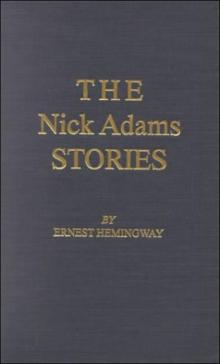 The Nick Adams Stories
The Nick Adams Stories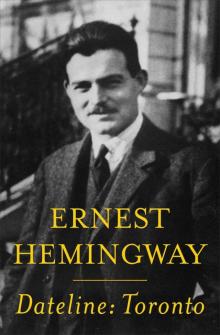 Dateline- Toronto
Dateline- Toronto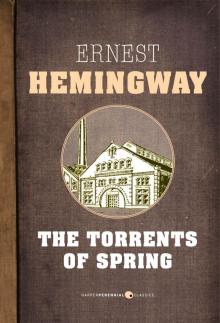 The Torrents of Spring
The Torrents of Spring Short Stories
Short Stories